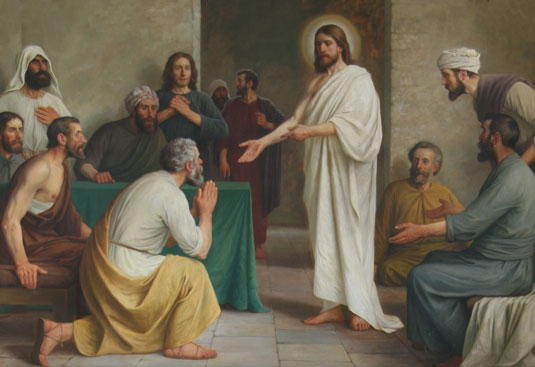WONDERING GURU
28th
April 2024
5th
Sunday of Easter-Year B
(Acts 9: 26-31; 1 John 3: 18-24; John 15: 1-8)
Introduction- Jesus delivers this teaching just after the last supper. As Jesus says these words, He was facing death and the collapse of His core leaders. One disciple was preparing to betray Him. Another was going to deny Him three times to save his own neck. The rest of the disciples were going to flee. Jesus Christ wants his disciples and his future followers to know that He is the True vine. And that without abiding in Him we will fall away. The vitality of our spiritual lives depends entirely on our connection with the vine. The question we must answer is this: Are we connected with Christ enough to produce good spiritual fruit? Jesus used two very important illustrations to discuss this aspect of fruitfulness the seed and the Sower (Mt 13:1-9; 18-23) the vine and the branches Jn 15:1-8.If you see the salvation story fruitfulness was expected from the beginning of creation. Fruitfulness was God’s command to Adam - Gen 1:28- "Be fruitful and increase in number." Fruitfulness was God’s promise to Noah - Gen 8:22- "As long as the earth endures, seedtime and harvest, cold and heat, summer and winter, day and night will never cease." Fruitfulness is God’s desire for each disciple - Jn 15:8- This is to my Father’s glory, that you bear much fruit, showing yourselves to be my disciples. There are three stages of fruitfulness.
I. The
Positioning Stage-The Greek word for remain or abide
literally means to dwell or to stay. This conveys the implication of being in a
fixed state or continuing in the same position. It gives us the idea of
permanent address. The house belongs to Jesus and we take all our identity,
sustenance, nourishment and rest in His house.
As long as you stay in His house and get all the nourishment you are
bound to bear good fruit. But the moment
you cut off from this nourishment you bound to be fruitless. This brings us to
the second stage.
II. The Pruning
Stage- Sometimes the
trees grow big and leafy. They look really great. They produce lots of fruits
but small in size and tasteless. When this happens, the gardener knows that it
needs heavy pruning. God does the same with
our life too. He prunes areas of our life to make us yield quality tasty fruit.
Sometimes the branches will have bad spots, misdirected shoots and discoloured
leaves. All of these things need to be removed for the branch to become
fruitful. In our life too we need little pruning. We all have bad spots in our
lives that limit our walk with Christ. We all have aspects of our walk that are
misdirected. We all have areas of our walk that are discoloured. What could be the possible areas for pruning
in our lives? May be our attitudes, our
passions, our relationships, our services, our motives etc. What is the purpose of pruning? Why God wants
to prune us? There is only one purpose
in pruning. God prunes us not to punish,
not to harm, not to damage but to make us more fruitful.
III. The
Production Stage-Christians are expected to bear fruit. Christ
fully expects us to live in such a way as to bear much fruit for the kingdom. So,
the progression or the fruitfulness cycle is a.) No fruit b.) Some fruit c.)
More fruit d.) Much fruit. No two
branches bear the same amount of fruit. The same is true of Christians. Not all
Christians are 100 percent fruit bearers. Fruitfulness is directly related to Christian
maturity. You have to give 100 percent to Christ in order to bear 100 percent
fruit
Conclusion-God
desires for each of his children the very same things that we desire for our
own offspring. He seeks maturity both in terms of our relationship with him and
our relationships with each other. Part of that maturity is that we learn to
find our place in the body of Christ just like we expect our children to find
their place in society and earn a living contributing to the needs and make up
of society.






